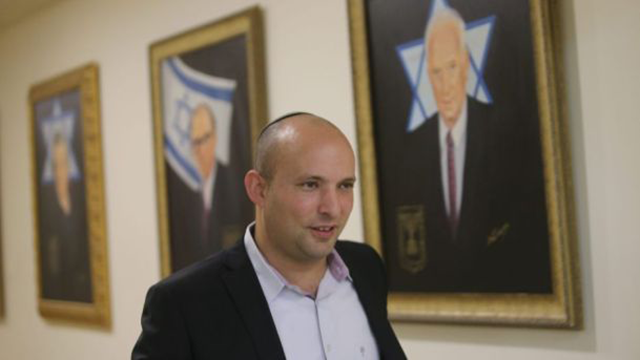Meir Lahav and Leslie Leiserowitz’s joint research forms basis for understanding processes in nature that are used as scientific foundation for the future development of drugs.

Education Minister Naftali Bennett, who accepted the recommendation of the Israel Prize jury, headed by Prof. Itamar Willner. Credit: Alex Kolomoisky
The Israel Prize laureates in chemistry and physics for 2016 are Prof. Meir Lahav and Prof. Leslie Leiserowitz of the Weizmann Institute of Science. The announcement was made last Thursday by Education Minister Naftali Bennett, who accepted the recommendation of the prize jury, headed by Prof. Itamar Willner.
The jury cited the pair’s joint breakthroughs in understanding the processes of self-assembly of chiral structures, similar to the property of the materials in nature. In their joint research over the years, Lahav and Leiserowitz succeeded in deciphering the chemical mechanisms of the formation of these materials.
The two researchers have won broad international recognition for their joint achievements, and their research forms the basis for understanding processes in nature that are used as a scientific foundation for the future development of drugs.
Leiserowitz is a professor emeritus of the Weizmann Institute. Throughout his scientific career he focused on key problems of solid-state chemistry, including stereochemistry; chemical reactions in a crystal state; and the design of 3-D reactions. He has received several awards, including the Weizmann Institute’s Ernst David Bergmann Prize, the Prelog Gold Medal from the Swiss Federal Institute of Technology and the Royal Swedish Academy of Sciences’ Gregori Aminoff Prize. In addition, he was elected to Leopoldina (the German Academy of Sciences).
Lahav, also from the Weizmann Institute, has also earned great international recognition for his groundbreaking work. His past awards include the Prelog Gold Medal, the first prize of the Israel Chemical Society and the Gregori Aminoff Prize.
Lahav also won the Chirality Medal instituted by the Italian Chemical Society, and both he and Leiserowitz were awarded the Israel Chemical Society’s Prize for the Outstanding Scientist in 1999.
